|
On Friday afternoon, August 29th,
Lincoln Mayor Tracy Welch and Lincoln Director of Tourism Scott
McCoy were joined by John and Darlene Ruh of Chicago for a tour of
the former Heartland Bank building located at 501 through 508
Broadway Street in Lincoln. Earlier that day, the city of Lincoln
had officially taken possession of the building, and the Ruhs were
there to see what would be the future home of a model train set John
Ruh has spent the past 20 years designing. The train set is a
complete depiction of the Mother Road, Route 66 from Chicago to Los
Angeles.
‘I’m excited that we have officially closed on the Heartland Bank
building on Broadway Street,” said Welch. “This marks an important
step forward for our community as the building will soon become home
to the new city museum and also support various economic development
initiatives.”
Welch concluded, “The museum will open with its first exhibit in
2026 – John and Darlene Ruh’s one-of-a-kind Route 66 train exhibit –
bringing a unique attraction to Lincoln while also supporting the
growth and future of our community.”
John Ruh has invested a lot of time into designing the train model
that is currently located in the basement of the Ruh home in
Chicago. For years, the Ruhs have welcomed people into their home to
see the train set and watch the train as it traveled the route.
Within the landscape of the route are various depictions of sites
one would see as they traveled through each state along the Mother
Road.
John Ruh noted that while it takes folks a couple of weeks to do the
route justice if they travel by car, with the train set, they can
make the entire trip in about an hour.
The Heartland Bank Building is approximately 11,000 square feet, but
is divided into three distinct sections. The largest of those three
takes up about 50 percent of the footprint and is the former banking
center on the east end of the building. This is where the City of
Lincoln Route 66 Museum will be housed and the new home of the Ruh
train set.
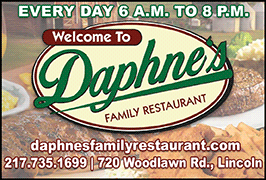
The other half of the building is
divided into two sections of about equal size. The middle one
quarter of the building is set up with its own entrance, a reception
area, several offices, and a small conference room at the back.
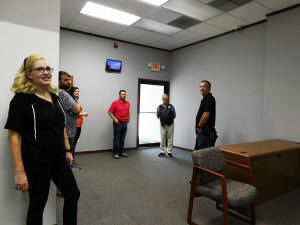
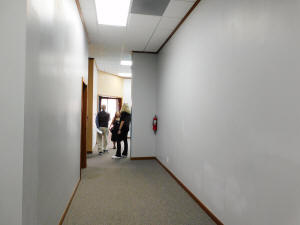
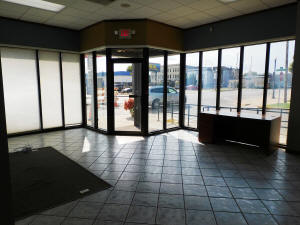
The far west section also has its
own front door entrance, plus a back entrance facing Chicago Street.
It also has a reception area, a few offices, and a much larger
conference room in the back.
Welch has explained that the vision for right now is to establish
the museum, then develop the middle section into a business
incubator with the far west section being set aside for economic
development.
On Friday, the Ruhs took a tour of the entire building, then
returned to the banking center portion to talk about how it will be
utilized and how the train may be incorporated into the museum.
The Ruhs are donating the train to the city, so it will become city
property once everything is settled. John Ruh said that he has, for
the past five years or so, been hoping to find some place to locate
the train that would give the public access so that it can continue
to be appreciated. He said that giving it to Lincoln was the ideal
situation, and that being patient with finding the train a new home
had paid off.
When asked how they felt about giving away a big part of themselves,
Darlene Ruh laughed and said that she was quite alright with the
train finding a new home.
She explained how the train came to be, saying it began as a little
model train set placed around the Christmas tree for their children
to enjoy. She said the kids did enjoy it very much as did she and
John. Then John had said it would be nice if they could have the
train set up year round, and Darlene agreed. She said that the
family home had a large basement that was divided into two sections
of about equal size. One section was semi-finished and the kids
enjoyed being down there quite often. The other half was rougher,
and housed the mechanicals for the house such as the furnace. She
suggested that John move the train set to the unfinished section of
the basement and then the kids (and John) could go down and play
with it anytime they wanted to.
She said the train from there began to grow into what it is today.
She said she personally didn’t pay a lot of attention until one day
John came upstairs and said, “you need to come see what I did.” She
followed him downstairs and to her amazement, he had cut a hole in
the wall between the two sections of the basement, and the train was
now rolling into that finished section as a part of its routine
route. “I said what did you do! You cut a hole in our wall! And he
said, ‘it’s not a hole, it’s a tunnel’.” Darlene said from there,
the train just continued to grow until it skirted the perimeter of
the entire basement.

In answer to the original question,
John Ruh said he felt it was time for the train to have a new home,
and besides that, giving the Route 66 train to Lincoln did not mean
he was out of the model train business. He said there are other
trains in the basement, including a model of the Chicago EL
(Elevated Train) that travels close to the ceiling in the basement.
He said that he was happy to find someone who wanted the train and
would do right by it, giving it a home where the public could still
enjoy it.
On Friday a lot of the talk in the informal meeting focused on how
the city planned to incorporate the train into the museum. McCoy
explained that the museum will be a melting of Abraham Lincoln and
Route 66, with the greater focus being on Route 66.
Ruh said he felt that was appropriate, and reviewed the history of
Route 66 and drew a straight line back to Abraham Lincoln.
As many Lincolnites know, the city of Lincoln was christened by
Abraham Lincoln before he ran for president of the United States.
Abraham Lincoln was well known in Lincoln and Logan County as a
circuit attorney and also the surveyor who outlined the borders of
the county and named it Logan after a good friend and fellow
politician from southern Illinois.
The town of Lincoln was strategically located because of the rail
system that was being designed to traverse from Chicago to St.
Louis. The new town would be a stop for the train, and Mr. Lincoln
christened the town just feet away from what would be the first
train depot for the town of Lincoln.
When the layout for Route 66 was proposed, the segment that went
from Chicago to St. Louis followed the rail, bringing Route 66 to
Lincoln in Logan County. Lincoln, and Logan County, is one of the
only places in the state that can draw such a straight line
connecting Abraham Lincoln and Route 66. That line gives this
community a unique opportunity to attract tourists seeking not only
the history of Route 66 but also those who strive to learn more of
the life of the nation’s 16th president.
Ruh is a person of vision, and he is already coming up with
suggestions of how the city can promote and exploit both of its
major draws for the benefit of the community. He said that he could
envision especially through 2026, which is the 100th anniversary of
Route 66, having monthly events that would help draw people to the
community.
[to top of second column] |
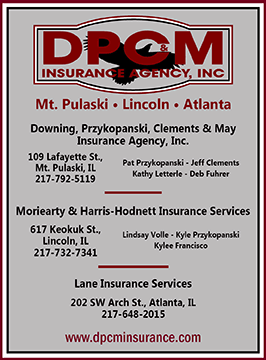
He also wanted to
know if the people of the community are behind the city in its
efforts, especially the downtown businesses. He was told that
the feedback from the downtown businesses as well as Lincoln
citizens has been very positive.
Welch said that when McCoy came on board as the Director of
Tourism for the city, he felt it would be key to get the
downtown businesses support. He said McCoy has invested time in
calling on those businesses and talking to the owners about the
future. McCoy recognizes that tourism is all about generating
dollars not just for the museum and the city, but for all the
businesses in town. He often talks about tourist attractions
that he calls “drive by shootings” where people come into an
area, see an attraction, stop, jump out of their cars, take a
selfie and then head on down the road. He said that type of
tourism does nothing to help a town.
In McCoy's vision, the goal is to get people out of those cars
to do walkabouts within the communities, visiting shops,
stopping for a bite to eat and even spending the night in local
motels.
He has said that the goal will be to have recommendations of
other sites to see in Lincoln and Logan County and suggestions
of great places to eat and shop in Lincoln specifically.
Ruh wondered where in the main building the train would be
located, and McCoy said that was yet to be determined.
For the most part the banking center looks like it did the day
before the bank closed the branch in 2024. The far east side has
the row of teller stations with a long desk area separating the
lobby area from access to the bank safe. Throughout the building
there is still office furniture including in the banking center.
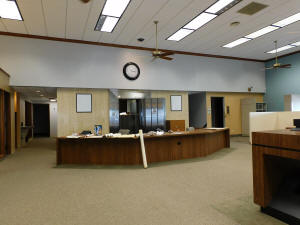
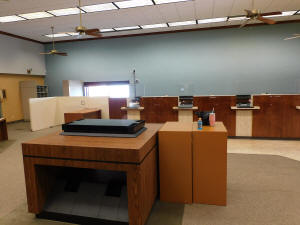
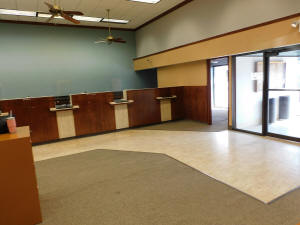
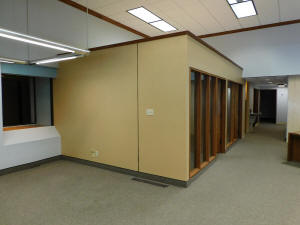
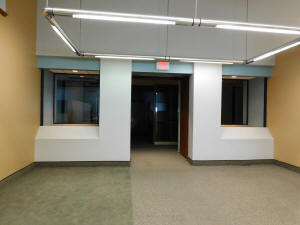
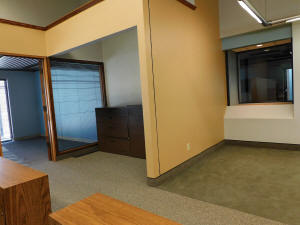
McCoy said that there will need to
be a clean out and it will be determined what stays to be repurposed
and what has to go.

He noted that there is a big
project that will have to be completed. The intention is to bring
bus tours to Lincoln for a stop at the museum. With that in mind,
the public restrooms in the building now are inadequate. McCoy said
there would need to be mutli-stall restrooms built within the
building to accommodate larger volumes of people. There will also
need to be a study of the current walls to see what is permanent and
if anything can be taken down or revamped to work better as a part
of the museum.
Until that work is done, or at least underway, it is going to be
difficult to determine the exact layout of the train set. What he
does know though, is the intent is to make the train the focal point
of the museum, and also the object that ties everything together
within the museum.
The city has been in contact with Landmark Illinois, a not for
profit philanthropy group that offers support to all Illinois
historic sites. That organization has volunteered to go into the Ruh
home, disassemble the train set, pack it up and move it to Lincoln.
Ruh said he will be very interested to see how that is all
accomplished.
McCoy said that the city is confident that Landmarks will be able to
do everything it has promised to do.
Regarding a time line, McCoy again said that was yet to be
determined, but the goal is to have the museum open in the Spring of
2026.
"This is an exciting major step for the City of Lincoln and our
strategic plan to capitalize on the massive tourism industry,” said
McCoy. “This building will become the magnet where we'll give
tourists a unique experience. But more importantly, we'll be able to
directly showcase our local businesses, hotels, restaurants, and the
Community -- and capture those outside tourism dollars."
"It was wonderful to have John and Darlene Ruh here today. John's
Route 66 model train exhibit will be a focal point of this new
attraction. We are thrilled he chose Lincoln as the future home of
his one-of-a-kind Route 66 exhibit."
The city of Lincoln purchased the bank building for $150,000. The
cost will be paid in two installments and is being funded by the
hotel/motel tax collected by the city.
Earlier this year, city aldermen voted to retain all the tax
collected from motel stays in the city and utilize that money to
promote tourism specifically in Lincoln. Prior to this, about 85 to
90 percent of the dollars collected had been passed on to the Logan
County Tourism Bureau.

The city voted recently to continue
supporting the LCTB with $30,000 per year. The Logan County Board
also voted to support the bureau with the same dollar amount.
The city also arranged for the purchase of most of the LCTB assets
for a minimal amount. This includes the Railsplitter Covered Wagon,
the welcome garden at the corner of Kickapoo and Pekin Streets, the
Lincoln letters and oversized donut located in the parking lot area
of Mel-O-Cream Donut Shop on North Kickapoo, and the watermelon
benches recently ordered by the LCTB for various locations in the
city.
The LCTB is retaining ownership of the Mill on Route 66 Museum and
has recently made that their main office and tourism visitors
center.
Nila Smith
|